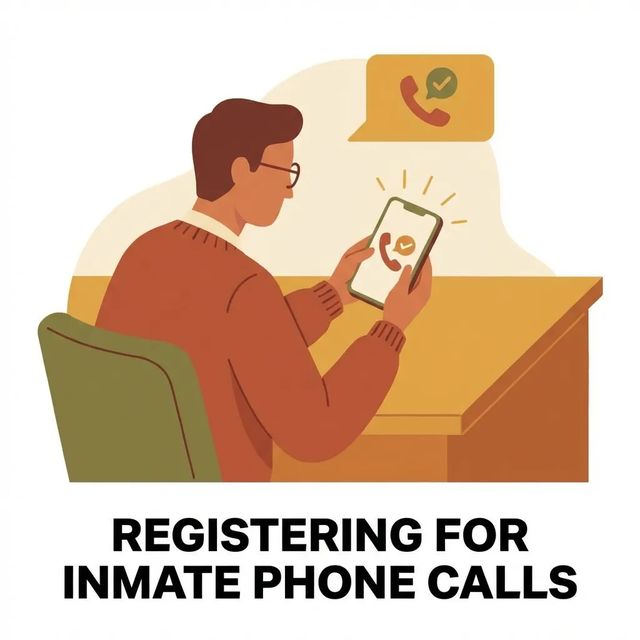Lynaugh Unit, TX
Need to reach someone at Lynaugh Unit? Look up an inmate, send messages or mail, add commissary funds, or schedule a visit.
Explore
Find an Inmate at Lynaugh Unit, TX
Search for a loved one and send messages and photos in minutes.

Guides for This Facility

How to Schedule Your First Visit with an Inmate at Lynaugh Unit (TDCJ Online Scheduler)
Visiting someone at Lynaugh Unit for the first time? Start by creating an account in the TDCJ Online Visitation Scheduler. Once you've filled out your details, you'll either book your visit online or be directed to call the unit directly.
Read Guide
How to Send Money to Someone at Lynaugh Unit: All Accepted Deposit Options and Important Restrictions
Sending money to someone at Lynaugh Unit is straightforward once you pick an approved deposit method and confirm you're allowed to send.
Read Guide
Setting Up Phone Calls from an Inmate at Lynaugh Unit: Registration, Call Rules, and Troubleshooting
Setting up phone calls with someone at Lynaugh Unit comes down to two things: registering your number correctly and understanding what TDCJ's phone system allows. Here's what you need to know—and what trips people up most often.
Read GuideAt a Glance
Visitation
- Visiting at Lynaugh Unit is held Saturdays and Sundays from 8:00 a.m. to 5:30 p.m.
- Inmates are normally allowed one visit per visiting cycle (a visiting cycle begins Monday and ends the following Sunday).
- A regular visiting period is two hours long and begins when both the inmate and visitor(s) are present.
Communication
- Securus remote video visits at Lynaugh Unit cost $10.00, last 60 minutes, and inmates are limited to one remote video visit per month.
- JPay e-messaging requires purchase of electronic stamps and messages are submitted online, screened, and then delivered to the inmate’s tablet or printed copy.
- Inmate telephone calls are limited to 30 minutes, are monitored/recorded except calls to an attorney of record, and are processed through the TDCJ vendor telephone system.
Mail & Letters
- Envelopes must include the inmate's full name, TDCJ number, and the unit address for Lynaugh Unit mail.
- Books, magazines, and newspapers may be mailed only directly by the publisher, publication supplier, bookstore, or online bookseller.
- Publications sent to inmates are subject to review and can be rejected by staff.
Sending Commissary
- Accepted deposit options include money orders/cashier's checks, ACH, ACE, eCommDirect (Texas.gov), JPay, and TouchPay.
- Since September 1, 2020, only senders on the approved visitor list or the Inmate Telephone List can deposit money to an inmate.
- Do not send trust fund deposits to the inmate's facility of assignment.
Contact Info
- JPay e-messaging requires purchase of electronic stamps; messages are submitted online, reviewed, and delivered to the inmate's tablet or email if approved.
- When contacting the facility, have the inmate's full name, date of birth, and any known aliases ready.
- Avoid sending sensitive personal information via unsecured email; use the facility's secure portals or verified contact methods.
Based on official sources and community feedback.Learn how we verify
Topic Overviews
Visitation
Visiting at Lynaugh Unit is a privilege that can be limited for security, health, or disciplinary reasons. In-person visits happen Saturdays and Sundays from 8:00 a.m. to 5:30 p.m. Eligible inmates typically get one visit per week, lasting two hours from when both you and the inmate are present. If you're traveling more than 250 miles one way, the warden may approve an extended visit of up to four hours. Adults 18 and older need a current government-issued photo ID. Visitors 17 and under may need a birth certificate, state ID, or student ID. To schedule, create and verify your own TDCJ Online Visitation Scheduler account, complete the background questionnaire, and enter your phone number in XXX XXX XXXX format. Leave your cell phone in the car—they're banned inside the secure perimeter. Don't bring cash, though coins up to $35 are allowed.
Read full guideCommunication
Lynaugh Unit offers phone calls, electronic messages, and remote video visits. Phone calls follow TDCJ Inmate Telephone System rules: 30-minute limit, monitored and recorded (except calls to an attorney of record). Use the vendor network to register and pay. TDCJ telephone lines are answered Monday–Friday during published hours, and Lynaugh's Inmate Technology office lists customer support hours as Monday–Friday, 8:00 a.m. to 3:00 p.m. (effective February 2, 2026). Remote video visits run through Securus—60 minutes for $10.00, limited to one per month. For messages, JPay e-messaging requires an online account and electronic stamps. Messages are screened, then delivered to the inmate's tablet or printed when approved. Tablet access depends on eligibility, and some apps may have vendor fees.
Read full guideMail & Letters
To send mail to Lynaugh Unit, write the inmate's full name, TDCJ number, and unit address on the envelope. Include your full return address. Texas often routes personal mail through a centralized processing system—incoming letters are screened, and accepted pages may be scanned for delivery to an inmate's secure device or printed. Legal and privileged mail follows a different path, and publications from verified publishers or sellers may go directly to the unit. Books, newspapers, and magazines must come directly from the publisher, publication supplier, bookstore, or online bookseller. Staff can review and reject items that don't meet facility rules. Stick to standard mail guidelines: use acceptable paper sizes and don't include contraband or prohibited loose items.
Sending Commissary
Lynaugh Unit accepts Inmate Trust Fund deposits by money order or cashier's check, plus electronic options through ACH, ACE, eCommDirect (Texas.gov), JPay, and TouchPay. Since September 1, 2020, only people on the inmate's approved visitor list or Inmate Telephone List can deposit funds—confirm you're approved before sending anything. Don't mail trust fund deposits to the inmate's facility of assignment, and don't mix personal mail with deposits. Follow each vendor's processing rules and fees. The Trust Fund office can confirm whether a deposit was received, but account details go only to the inmate. Avoid cash or personal checks, and follow the centralized deposit instructions exactly.
Read full guideCommon Questions
Showing 6 of 14What are the visiting hours at Lynaugh Unit?
Visits at Lynaugh Unit are held Saturdays and Sundays from 8:00 a.m. to 5:30 p.m.
VisitationHow long is a regular visit and how many visits can an inmate have per week at Lynaugh Unit?
A regular visit is two hours long and begins when both the inmate and visitor(s) are present. Inmates are normally allowed one visit per visiting cycle (Monday through the following Sunday).
VisitationHow do I schedule a visit at Lynaugh Unit?
Use the TDCJ Online Visitation Scheduler. Create your own account (staff can't do this for you), verify it with the emailed 7-digit code, and complete the background questionnaire. Enter your phone number in XXX XXX XXXX format. If you see "Call Unit" or can't schedule online, contact the unit directly. The portal only works for residents of the United States, Canada, and Mexico.
VisitationHow do I schedule a remote video visit with an inmate at Lynaugh Unit?
Schedule a remote video visit through Securus using their booking and payment process. Visits cost $10.00, last 60 minutes, and inmates are limited to one remote video visit per month. For problems, call the Securus Customer Service Center at (877) 578-3658.
CommunicationHow do I send an electronic message to an inmate at Lynaugh Unit?
Use JPay e-messaging: create an account, buy electronic stamps, and submit your message online. Messages are screened and, once approved, delivered to the inmate’s tablet or provided as a printed copy.
CommunicationWhat are the rules for phone calls from inmates at Lynaugh Unit?
Calls are limited to 30 minutes and are monitored and recorded, except for calls to an attorney of record. Register and pay through the TDCJ telephone system. TDCJ lines are answered Monday–Friday during published hours. Lynaugh's Inmate Technology office lists support hours as Monday–Friday, 8:00 a.m. to 3:00 p.m. (effective February 2, 2026).
CommunicationMore Guides
Ready to Connect?
Search for your loved one to start communicating today
Did You Know?
Lynaugh Unit is a Texas Department of Criminal Justice (TDCJ) facility. Visiting hours are Saturdays and Sundays from 8:00 a.m. to 5:30 p.m.
This guide is based on feedback from dozens of families and official facility documentation. Learn how we verify
